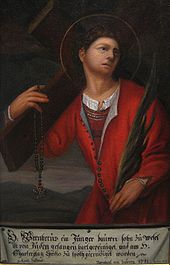380 ⟶ St. Gregory of Nyssa's Antisemitic Rhetoric
St. Gregory of Nyssa calls Jews "murders of the Lord, assass...Year
380
386
1833
1938
1964
1983
🗣️ St. Gregory of Nyssa's Antisemitic Rhetoric
St. Gregory of Nyssa calls Jews "murders of the Lord, assassins of the prophets, rebels and detesters of God, companions of the devils, a race of vipers."⟶

ChristianityIdeologyAntisemitismReligious RhetoricHate SpeechTheologySt. Gregory of Nyssa
 Turkey
Turkey🗣️ John Chrysostom's Adversus Judaeos Homilies
John Chrysostom of Antioch writes eight Homilies called Adversus Judaeos (lit: Against the Judaizers). See also: Christianity and antisemitism.⟶

ChristianityIdeologyAntisemitismReligious RhetoricHate SpeechHomiliesJohn Chrysostom
 Turkey
Turkey📖 Publication of Clemens Brentano's Antisemitic 'Dolorous Passion'
Clemens Brentano published The Dolorous Passion of Our Lord Jesus Christ According to the Meditations of Anne Catherine Emmerich. The "Dolorous Passion" is claimed to reveal a "clear antisemitic strain throughout", with Brentano writing that Emmerich believed that "Jews ... strangled Christian children and used their blood for all sorts of suspicious and diabolical practices."⟶

AntisemitismBlood LibelReligious Anti-SemitismIdeology19th CenturyLiteratureAnne Catherine Emmerich
 Germany
Germany🍄 Publication of *Der Giftpilz* (The Poisonous Mushroom)
Der Giftpilz is a children's book published by Julius Streicher in 1938. The title is German for "the Toadstool" or "the poisonous mushroom". The book was intended as anti-Semitic propaganda. The text is by Ernst Hiemer, with illustrations by Philipp Rupprecht (also known as Fips).⟶

PropagandaAntisemitismChildren's LiteratureNazi GermanyJulius StreicherHate SpeechIdeologyThe Poisonous Mushroom
 Germany
Germany🕊️ Vatican II Document: Nostra Aetate
The Roman Catholic Church under Pope Paul VI issues the document Nostra aetate as part of Vatican II, repudiating the doctrine of Jewish guilt for the Crucifixion.⟶

Catholic ChurchVatican IINostra AetateInterfaith DialogueAntisemitismChristianityTheologyHolocaust
 Vatican City
Vatican City⛪ Lutheran Church–Missouri Synod Disavows Luther's Remarks
The Lutheran church–Missouri Synod officially disassociates itself from "intemperate remarks about Jews" in Luther's works. Since then, many Lutheran church bodies and organizations have issued similar statements. (See Martin Luther and the Jews)⟶

Martin LutherAntisemitismChristianityLutheranismReligious ReconciliationTheologyChurch HistoryReligious Tolerance
 United States
United States Germany
Germany